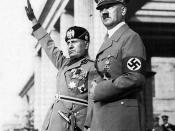During the twentieth century, totalitarian regimes have attributed much greater social and political power to the arts (and correspondingly sought to censor them) than have liberal democratic governments. Why might this be so?
Totalitarianism is of or pertaining to a centralized government that does not tolerate parties of differing opinion and that exercises dictatorial control over many aspects of life.� Democracy is a government by the people; a form of government in which the supreme power is vested in the people and exercised directly by them or by their elected agents under a free electoral system.� Therefore it makes logical sense that a totalitarian government would need to exercise censorship and propaganda with higher levels of importance to ensure the messages of that government are being forced upon its people and being consumed by the people. This has been evident throughout the 20th century especially within world wars one and two between Britain and Germany.
Language and propaganda were massive contributors in the 20th century by governments through the use of arts to control their people. As written by General Ludendorff of Germany; "words today are battles, the right words, battles won; the wrong words, battles lost". Romantics, patriotism and heroics were the words used by official propagandists from both Britain and Europe; painting the picture that it is heroic and manly to die on the battlefield for your country.
"Propaganda attempts to force a doctrine on the whole people... Propaganda works on the general public from the standpoint of an idea and makes them ripe for the victory of this idea." Adolf Hitler
It was the initial set up of the Reich Chamber of Commerce in 1933 that gave the Nazi's the ability to control and filter the culture through the use of literature, art, films, radio etc. that...


